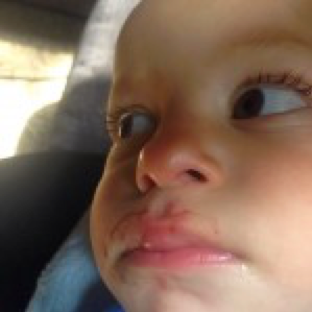To the Bystanders who Ignored my Grandson's Accident
- Aug 11, 2014
- 3 min read

Fat lip less most of the blood
Published in ChicagoNow, August 11, 2014
Accidents happen. They especially happen to toddlers. My grandson’s fat lip from falling on his face is sad but not shocking. Nor is the fact that a ten-year-old ran into him at full speed, knocking him face-first onto the sprinkler park pavement. He’s pretty short. She didn’t see him.
What is shocking is the reaction, no make that lack of reaction, of the other adults on the scene. You can see from the photo below that they were there watching their kids play. So, what did they do when a 21-month-old was screaming with blood gushing from his mouth? Nothing. Aside from the 10-year-old who said “sorry,” not a soul asked my daughter if her child was okay or if help was needed.
Well, that’s not entirely true. The zoo water park officials rushed to the scene with accident report forms in hand. After all, lawsuits could be filed, right? They helped mop up the blood and even gave my daughter an ice pack.
But what about all of the witnesses? Maybe they were busy taking movies of it on their iPhones in case it was YouTube worthy. Maybe when they saw the zoo officials, they didn’t think their help was needed or they didn’t want to get involved. But a simple random act of kindness would have gone a long way here.

Before the fall — Lots of folks sitting at the umbrella tables
I’ve been wondering about this phenomenon recently. You know, the one about folks who witness a problem and either film it or ignore it. Of course, “not getting involved” is nothing new. Back in 1964, 28-year-old Kitty Genovese was brutally murdered. Despite the fact that many heard her cries for help, no one called the police for 30 minutes. I’m sure 50 years later, this bystander effect is still the norm.
Recently, when leaving a public park with my granddaughter, I saw a man walking with a crying boy who was holding his arm that clearly seemed to be broken. I overheard the man saying he knew about this type of injury and would walk the boy home. The park was packed with kids and adults, including counselors from a day camp. When I asked several adults about the boy and about who the man was, most shrugged their shoulders. One counselor said she had seen it but assumed the man was “someone’s dad.” Despite the abundance of cell phones, no one had called 911 for the child.
I followed the man and child in my car and saw that the man had walked the boy to his home. Maybe that was dumb and I should have called 911, but he seemed like a nice man. Here he was, the one person who chose to get involved, and here I was suspicious of his motives. Maybe I just answered my own question about bystanders. But I am still puzzled about no one calling for help. I know if I hadn’t found the boy delivered to his home, I would have called it in.
The filming of a perceived crime or an accident without doing anything is a more recent weird spin on being a bystander. You know the cell phone videos that end up on the nightly news. When I see them, I wonder why the person didn’t just put down the stupid phone and offer to help. Or if the situation was dangerous, did the “reporter” call the police before filming? I’m sure these videos are helpful in catching and prosecuting the bad guys, but they don’t do much to help the victims.
I guess I have wandered far from a routine sprinkler park accident. But I feel sad that not one person there could even express sympathy or ask my daughter if she needed a hand getting to her car. Even an “OMG – is he ok?” would have felt better than indifference.
The reluctance of most folks to help one another is not new but still makes me sad. Why do so few people take the time to ask, “Are you all right?”
.jpg)




















Comments